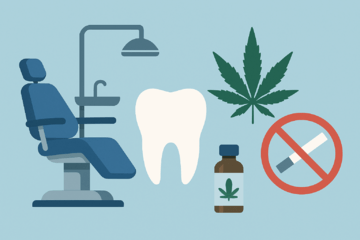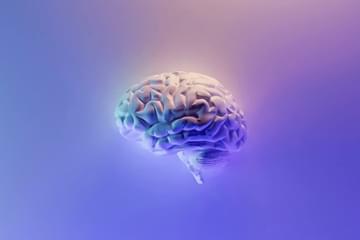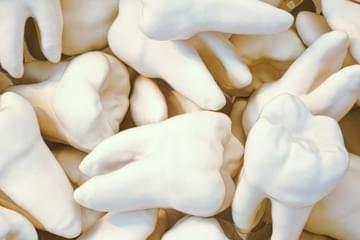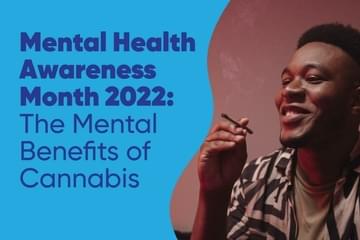
Can Cannabis Help With My OCD?
Published on 4/4/21
Neurotypical people often see obsessive-compulsive disorder (OCD) as a quirky condition depicted in movies and TV shows. Saying things like, "Yeah I clean my house once a week, I'm OCD about it getting too messy" is not the same as those who struggle with this condition. Those who do struggle with OCD, though, the repetitive tics and obsessive behavior can severely interrupt life and, in serious cases, impede every facet of daily life.
Traditionally, doctors have relied on pharmaceuticals and therapy to combat OCD, but recent studies have linked compulsive tendencies to the body's endocannabinoid system, opening new avenues for treatment possibilities. And while federal prohibition is still standing in the way of large-scale clinical trials, the connection between OCD and cannabis is drawing interest from researchers and patients alike. So can cannabis help your OCD? Because OCD and marijuana affect different people in different ways, there is no one size fits all answer, but in this piece, we'll break down a simple OCD meaning, how the disorder's multiple facets affect the endocannabinoid system, can marijuana cause obsessive behavior and the latest research into THC, CBD and OCD.
What Is OCD?
 Unsplash
UnsplashObsessive-compulsive disorder is a condition that combines anxiety, fear and habitual behaviors. In some cases, OCD will show itself through repeated actions like repeatedly touching objects, opening and closing doors or cupboards, or bodily-focused symptoms like hair pulling, scratching, or vocal tics. In other instances, the disorder presents as obsessive cleaning or tidiness.
According to clinical estimates, millions of Americans suffer from OCD, with 1 in 40 adults and 1 in 100 children reporting either minor or extreme OCD symptoms. Like many behavioral impediments, OCD's effects fall on a wide spectrum from extremely minor to severely life-altering. Because studies have shown that OCD symptoms are largely due to irregularities in the brain's prefrontal cortex, basal ganglia, hippocampus and amygdala, doctors typically treat this disorder with SSRIs like Prozac and Zoloft. Outside of pharmaceuticals, cognitive behavioral therapy treats obsessive-compulsive behaviors as well. Now, as medical marijuana's mainstream standing continues to transform from reefer madness to a valid treatment option, early animal studies and anecdotal research have suggested that certain quantities of THC and CBD can help relieve OCD's anxiety, conditioned fear and habitual behaviors.
The Endocannabinoid System, Marijuana and OCD
 Unsplash
UnsplashAs we mentioned earlier, there are specific parts of the brain responsible for the symptoms of OCD. The prefrontal cortex, basal ganglia, hippocampus and amygdala are all hubs for the body's endocannabinoid system. As you probably already know, the active compounds in cannabis bind to CB1 and CB2 endocannabinoid receptors to regulate things like pain, hunger, nausea, anxiety, fear and more. By carefully triggering those endocannabinoid receptors with external forces like THC and CBD, some researchers are confident that cannabis could help quell the effects of OCD.
Anxiety
Anxiety is a strongly influential symptom of OCD. Anxiety is also acutely tied to CB1 receptors, and research shows that the blockage or absence of CB1 receptors in the brain can spark heightened anxiety, researchers and self-medicating patients have long-experimented with cannabis as an anti-anxiety OCD medication.
As we learn more about how THC interacts with the human endocannabinoid system, research and anecdotal evidence show the plant's main psychoactive compound can both reduce and increase anxiety, depending on dosage, body chemistry, and other factors. In small microdoses, THC dramatically reduces anxiety, but when taken in large quantities, THC can boost anxiety to new heights. Because of marijuana's lasting social stigma, some people may feel heightened anxiety at the thought of using a federally illicit substance, while a person in their 20s who grew up in California where cannabis is more normalized might be more comfortable treating anxiety with THC.
Fear
Along with anxiety, conditional fear is a central tenet of OCD. People who suffer from OCD are sometimes unable to naturally reduce their sense of fear, even when a situation poses no identifiable danger. The amygdala is the part of the brain responsible for regulating levels of fear and is also home to a large concentration of CB1 endocannabinoid receptors. Early studies using THC and CBD in rodents and synthetic cannabinoids in humans have shown that external manipulations to the amygdala's CB1 receptors can help diminish past and persisting fears. While low-doses of THC are typically preferred for targeting conditioned fear, early research and patient reports have shown that high doses of non-psychoactive CBD can have a similar effect on CB1 receptors.
Habitual Behavior
Chronic or habitual actions (tics) are perhaps the most well-known symptom of OCD. While science has not yet made the connection between repetitive urges and specific endocannabinoid receptors, CBD oil for OCD has been shown to help some patients reduce their habitual tics. Likewise, a study testing the effects of cannabis on Tourettes syndrome found that marijuana was able to reduce previously-uncontrollable tics.
The Current State of Research On Medical Marijuana For OCD
 Unsplash
UnsplashFederal cannabis prohibition has blocked tons of much-needed cannabis research, including clinical studies into the correlation between marijuana and OCD. A 2019 study, "The Endocannabinoid System: A New Treatment Target for Obsessive-Compulsive Disorder?" combined all of the currently available relevant research about both the endocannabinoid system's link to OCD behaviors and studies using marijuana and synthetic cannabinoids to treat OCD.
"There is some evidence that those with certain OCD symptoms, particularly obsessions, may be more likely to use cannabis, possibly as a means of coping with their symptoms," Dr. Reilly Kayser, MD, a psychiatrist and clinical research fellow in the Anxiety Disorders Clinic at the New York State Psychiatric Institute, said. "However, there are still more questions than answers regarding how exactly cannabis use affects OCD and anxiety symptoms."
In addition to a lack of conclusive research, the varying ways in which OCD and cannabis both interact with the body, as well as a lack of standardized cannabis products currently on the market have made it hard to replicate any experiments. Nevertheless, scientists and researchers focused on OCD are currently diving deeper into the cannabis connection to help alleviate the anxiety, fear and involuntary actions associated with OCD.
"This is an active area of research for us at the Center for OCD Research at Columbia University/New York State Psychiatric Institute," Dr. Kayser added. "We became interested in this question in part because we were hearing vastly different stories from our patients: some told us that cannabis helped to control obsessions, compulsions, or anxiety; others told us that it did nothing; and still others described the ways it worsened their symptoms."
Have you or a loved one had experience using cannabis in the treatment of OCD? Let us know if the experience was positive or too overwhelming in the comments below.


















